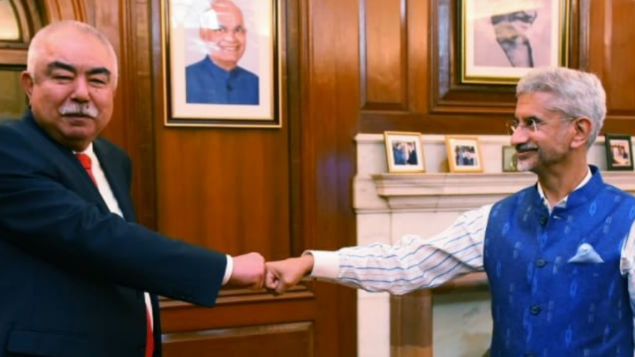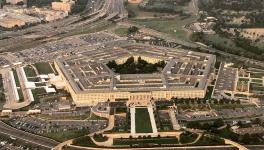Quad is East, Kabul is West, Never the Twain Shall Meet

External Affairs Minister S. Jaishankar (R) met the leader of erstwhile Afghan Northern Alliance Rashid Dostum (L), New Delhi, Sept 25, 2020
The policy planning with respect to Afghanistan has become an excruciatingly difficult exercise for New Delhi. Even a veteran great game addict like National Security Advisor Ajit Doval faces a challenging time ahead as Afghanistan slips out of the 19-year US-led war. Alas, everything in regional security has an American dimension to it nowadays — Quad, standoff in Ladakh, coronavirus pandemic, to name a few.
Even as Abdullah Abdullah, chairman of the Afghan High Council for Reconciliation, landed in Delhi on a tricky mission last Tuesday with a view to get India on board a “regional consensus” over the transition to an “interim government” in Kabul, Trump flashed a tweet threatening he intends to have the American troops back home for good by Christmas.
Moscow called it Trump’s election stunt, but Trump since insisted he is dead serious, since there’s no point in continuing with a “forever war” that is 19 years old. Trump is absolutely right.
But Russians are seldom wrong, too, when it concerns Trump. And their denial came at the level of Zamir Kabulov, Russian presidential envoy on Afghanistan and Moscow’s ace Afghan hand.
Trump possibly spoke with an eye on the peace talks at Doha, cracking the whip at recalcitrant elements — principally, President Ashraf Ghani. Can it be coincidence that Trump tweeted just as Ghani rushed to Doha?
This is a sad moment for India. India never turned its back on an Afghan friend in need. It’s an American trait — ‘Have gun, will travel’.
India knows that any “interim government” that US instals in Kabul will only end up implementing the Taliban’s (Pakistani) agenda. Succinctly put, this truly becomes a catch-22 situation.
Delhi must be worried like hell — as the recent “private visit” by Rashid Dostum, leader of the erstwhile Northern Alliance anti-Taliban front, suggests — and is clutching at straws. Unsurprisingly, at the talks in Delhi with Abdullah, Doval was flanked by the Chief of Defence Staff General Bipin Rawat and the Chief of Army Staff General Manoj Naravane. That was powerful messaging.
Meanwhile, a new narrative regarding the Taliban is getting established lately, whose authorship is write large on it. Per this narrative, Taliban is willing to forgo the Emirate and is open to power-sharing; and, Taliban realises it cannot have a system of government of its own choice, and has to reach a consensus through negotiations that is acceptable to all stakeholders, all the parties and to majority of Afghan people.
This narrative would have us believe that Pakistani military and ISI are having an exasperating time with the Taliban who wouldn’t listen and increasingly maintain distance from them, most Taliban leaders have moved out of Pakistan and if Taliban prefers Doha venue, it’s to keep Pakistan at arm’s length and so on.
Another part of the narrative is that Pakistani military now advises Taliban to become part of the Afghan political system, partake of democratic process, and form a political party and contest elections.
Of course, for a rational mind, the problem with this seductive narrative is that it is not backed by any empirical evidence. Besides, it’s a package — take it all or nothing.
To be sure, the tiding from Doha is that Taliban will never agree to work with President Ashraf Ghani who they regard as an American puppet, and Taliban cadres will take it as an act of betrayal to reconcile with him. That is to say, a deal that Ghani offered to the Taliban on the lines he struck with Mujahideen leader Gulbuddin Hekmatyar a couple years ago is simply out of the question.
All things considered, therefore, an interim government has become an imperative need for the peace process to proceed further and to have a ceasefire. The Washington establishment is proactively promoting the idea.
Abdullah’s visits to Pakistan and India can be seen in this light. It is entirely conceivable that Washington and Islamabad encouraged Abdullah to get Indian support for their upcoming project to create an interim government in Kabul that would be headed by him. Of course, if India delinks from Ghani, he’s practically finished.
The Americans are in tearing hurry to wind up the war and get into the next phase of the great game, which is to tackle the two “revisionist” powers — Russia and China — that challenge its global hegemony.
A future set-up in Kabul with the Taliban in command suits American interests. Taliban has never hidden its keenness to forge a strategic partnership with the US in the post-settlement phase.
The US is willing to overlook the Taliban’s reluctance to publicly disown its fraternal links with al-Qaeda. The point is, the US too has a complicated past involving the al-Qaeda.
In fact, the US first inserted al-Qaeda into the Afghan turf almost a decade before the Taliban was born. Secondly, the US is au fait with the strong marital and business ties binding the al-Qaeda and the Taliban in an inseparable relationship.
Suffice to say, the al-Qaeda fighters also intimate ties with the Taliban cadres, too, which in turn holds seamless potentials in a future scenario of geopolitical struggles against Central Asia, China, Russia, Iran, etc.
Interestingly, Robin Raphel, who nurtured the Taliban in its infancy in the 1990s and enjoyed tremendous bonhomie with the Pakistani elite, has recently resurfaced to enrich the nascent US-Pakistan-Taliban troika just when Afghanistan turns the corner and the geopolitical struggle against Russia, China and India is to commence.
In principle, in the forthcoming Afghan transition, it should gladden the Indian mind that Abdullah, an old friend, may come to head the post-Ghani interim government. It’s a victory of sorts, perhaps.
But the big question is: How far would Abdullah be effective to rein in the Taliban or secure a level playing field for India? In the Hindu Kush, power flows through the barrel of the gun — and Abdullah never held a Kalashnikov in his palm.
Plainly put, there is real danger that what may appear to be a victory that India is snatching out of the jaws of the defeat from the Afghan turf battle with Pakistan for the past two decades may turn out to be a Pyrrhic victory.
But what is the alternative? With the Quad as an albatross, there’s going to be severe limits to what India can do to safeguard its vital geopolitical interests in Afghanistan if it grates against the US strategies. Key players like Raphel were never well disposed towards India, either.
Finally, storm clouds are gathering on the Pakistani political landscape as most major opposition parties have come together under the rubric of Pakistan Democratic Movement (PDM) to demand that the country’s powerful generals surrender their stranglehold over politics and withdraw support for Imran Khan’s administration.
The PDM is kickstarting a nation-wide protest campaign today. When Maulana Fazlur Rahman — who, the legend says, parented the Taliban — appears as the PDM’s flag carrier, the situation becomes very murky. Hidden hands are at work, for sure.
Lost in the enchanting world of “two-front wars” and “hybrid wars” and the Quad, India cannot afford to lower its guard. The Quad serves no purpose here and will prove a liability insofar as US and Indian interests and priorities are irreconcilable as regards the future of Afghanistan.
At any rate, the American captaincy of the Quad stigmatises India in the South and Central Asian perceptions as a sidekick of the US and puts off like-minded regional states such as Russia or Iran — and even China — who are wary of the US’ history of manipulating terrorist groups as geopolitical tool. Geography condemns India to live in the region.
Read part 1 of this analysis here.
Get the latest reports & analysis with people's perspective on Protests, movements & deep analytical videos, discussions of the current affairs in your Telegram app. Subscribe to NewsClick's Telegram channel & get Real-Time updates on stories, as they get published on our website.
























